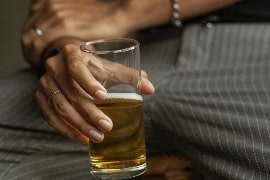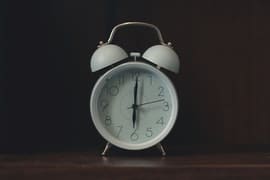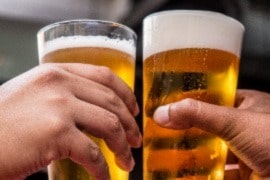Mixing alcohol and Zzzquil can cause dangerous side effects, more so than the already dangerous side effects of the substances on their own. Learn why you should avoid the combination.
Many people who have trouble sleeping turn to substances like sleeping pills or alcohol for help. About 10% of people use alcohol to self-treat sleep problems. Many people use sleep medications, including over-the-counter medications, to get to sleep. However, mixing alcohol with sleep medications can be harmful. It can be dangerous even if you mix alcohol with over-the-counter sleep medications such as Zzzquil.
Article at a Glance:
Important points related to Zzzquil and alcohol include:
- People often use alcohol and over-the-counter sleep aids like Zzzquil to help fall asleep
- Because they both depress the central nervous system, combining alcohol and Zzzquil may lead to increased side effects
- Some Zzzquil products contain alcohol, so combining them with even more alcohol can worsen side effects
- Alcohol can help you get to sleep but can also lead to poor-quality REM sleep and leave you feeling tired and less alert the next day
Side Effects of Mixing Alcohol & Zzzquil
Because Zzzquil and alcohol depress the central nervous system, using them together can increase their side effects. These increased side effects may include:
- Feeling very sleepy
- Having speech that is slurred
- Having trouble concentrating
- Feeling confused
- Having a headache
- Being dizzy
- Feeling like your mouth is very dry
- Having problems with your memory
- Having trouble moving
- Having low blood pressure
- Breathing more slowly than normal
If you are using a Zzzquil product that already has alcohol, then drinking alcohol in addition to the Zzzquil may worsen your symptoms.
An additional risk is driving. If you have had Zzzquil or alcohol. A study showed that diphenhydramine, the active ingredient in Zzzquil, caused drivers to be more impaired than alcohol. Therefore, taking alcohol with Zzzquil has the potential to impair driving. If the Zzzquil product you are taking already contains alcohol, then driving may be even more dangerous.
The Effects of Zzzquil on Sleep
Zzzquil is an over-the-counter drug that helps people get to sleep. The active drug in Zzzquil is diphenhydramine, which is an antihistamine. Diphenhydramine is sometimes used to control allergies. However, the drug also easily crosses into the brain, where it can cause sedation. The sedative properties of diphenhydramine are what make it a sleep aid. Diphenhydramine is the same drug that is in many over-the-counter products like:
- Goodsense Allergy Relief
- Goodsense Sleep Aid
- Nighttime Sleep Aid
- Simply Sleep
- Sleep Tabs
- Tetra-Formula Nighttime Sleep
However, some Zzzquil products contain other ingredients in addition to diphenhydramine to help you fall asleep. Two Zzzquil products also contain 10% alcohol to help as a sleep aid. The alcohol-containing Zzzquil products are:
- ZzzQuil Calming Vanilla Cherry Liquid
- ZzzQuil Warming Berry Liquid
The other Zzzquil products that do not contain alcohol include the Zzzquil capsules and any Zzzquil liquid that is specifically labeled alcohol-free.
What about off-brand ZzzQuil products? Like the brand-name product, off-brand ZzzQuil alternatives contain antihistamines like diphenhydramine or doxylamine as their main active ingredient. These products include generic diphenhydramine or doxylamine, or are sold as other brands like Benadryl, Banophen or Unisom.
The Effects of Alcohol on Sleep
Although alcohol can help you fall asleep, the sleep you have might not be high quality. Doctors believe that alcohol harms an important phase of the sleep cycle called rapid eye movement sleep, or REM sleep. If you drink before sleeping, you may have interrupted REM sleep, which can make you feel tired and less alert the next day. Experts believe this may happen even if you finish drinking up to six hours before you go to bed. Studies have shown that when you drink even a small amount, the next day you may have reduced alertness. However, in general, the more alcohol you drink, the more doctors think your sleep quality can be harmed. Additionally, alcohol may contribute to sleep-related health problems like:
- Sleep apnea
- Insomnia
- REM sleep disorder
If you or someone you know struggles with alcohol use, with or without sleeping aids, contact The Recovery Village to speak with a representative who can help get started toward a healthier life free of alcohol and sleep aids.
Articles Related to Alcoholism

Alcohol detox isn’t easy and not everyone can do it on their own. That is why alcohol detox and alcohol withdrawal treatment is administered by medical professionals.

Alcoholism takes many forms, and the stereotype doesn’t always hold true. So when do a few drinks with friends become a full-blown alcohol addiction? How do you know if you are an alcoholic?

While cirrhosis scars from excessive drinking are irreversible, quitting alcohol and leading a healthier lifestyle can help your liver heal from alcohol-related liver disease.

When detoxing, hydration is key. However, certain food groups also have benefits when it comes to helping with the discomfort of withdrawal symptoms and detoxification.

Detox from alcohol can begin within hours. Typically, alcohol withdrawal symptoms happen for heavier drinkers. Alcohol withdrawal can begin within hours of ending a drinking session.

Daily drinking can have serious consequences for a person’s health, both in the short- and long-term. Many of the effects of drinking every day can be reversed through early intervention.


Arnedt JT., Conroy DA., Brower KJ. “Treatment Options for Sleep Disturbances[…]ing Alcohol Recovery.” Journal of Addictive Diseases, 2007. Accessed June 1, 2019.
National Institute on Drug Abuse. “Prescription CNS Depressants.” March 2018. Accessed June 1, 2019.
National Institute on Alcohol Abuse and Alcoholism. “Alcohol Alert: Alcohol and Sleep.” July 1998. Accessed June 1, 2019.
Roehrs R., Roth T. “Sleep, Sleepiness, and Alcohol Use.” National Institute on Alcohol Abuse and Alcoholism. Accessed June 1, 2019.
Federal Transit Authority. “FTA Drug and Alcohol Regulation Updates.” 2005. Accessed June 1, 2019.
ZzzQuil. “Medicinal Sleep Aids“>Medicinal Sleep Aids.” Accessed February 22, 2022.
Drugs.com. “Diphenhydramine“>Diphenhydramine.” Accessed February 22, 2022.
Drugs.com. “Doxylamine“>Doxylamine.” Accessed February 22, 2022.
The Recovery Village aims to improve the quality of life for people struggling with substance use or mental health disorder with fact-based content about the nature of behavioral health conditions, treatment options and their related outcomes. We publish material that is researched, cited, edited and reviewed by licensed medical professionals. The information we provide is not intended to be a substitute for professional medical advice, diagnosis or treatment. It should not be used in place of the advice of your physician or other qualified healthcare providers.